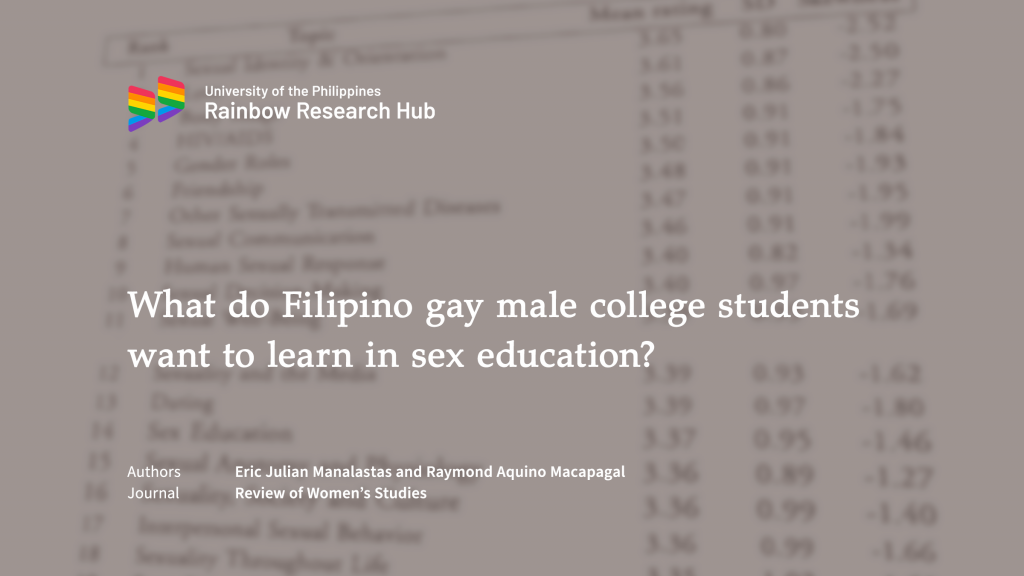
Essence
In this article, Eric and Rae identify topics that self-identified gay/bisexual male Filipino college students would like to discuss in a course on human sexuality. Some of the topics include love, body image, HIV/AIDS, gender roles, and friendship.
The current study exemplifies some good practices in using a mixed qualitative-quantitative approach in LGBTQI research, such as constructing and pilot testing non-heterosexist research materials, and conducting focus group discussions and in-person survey questionnaires with gay and bisexual participants.
Authors: Eric Julian Manalastas, Raymond Aquino Macapagal
Journal: Review of Women’s Studies
Citation: Manalastas, E. J., & Macapagal, R. A. (2005). What do Filipino gay male college students want to learn in sex education? Review of Women’s Studies, 15(1), 126–172.
Explore
Express
[Note: The study was conducted in 2005. Keep this in mind when answering questions 5 and 6.]
- What was the study’s objective?
- What research question/s did the study aim to answer?
- What was/were the study’s data collection method/s?
- What was/were the study’s data analysis method/s?
- What are the study’s design/methodological strengths?
- What are the study’s design/methodological weaknesses or points of improvement?
Engage
[Individual/group activity]
Answer the following questions:
- The study’s researchers used a learner-centered approach in designing the study. Why do you think they chose this specific approach? How did this approach inform the study’s design?
- The researchers provided feedback on the study’s results to interested participants. Why is this practice relevant to people doing LGBTQI research and research on minority groups more generally?
- The focus group participants mentioned some insights on research fatigue and how (presumably) because they are openly gay/bisexual, friends would ask them to participate in research projects. The study’s researchers also said that they used their personal and professional networks to recruit said participants—for example, their own students who were openly gay/bisexual and gay/bisexual faculty members who also had openly gay/bisexual students. If you were to replicate this 2005 study, how would you recruit your participants knowing how being openly LGBTQI may increase experiences of research fatigue?
[Group activity]
Choose one of the subgroups enumerated below and list sexuality education topics relevant to it. Similar to the current study, you may base this list on already existing literature and measures and/or conduct interviews or focus group discussions. This list should also “decenter” cisgender, heterosexual, and endosexual experiences, and be inclusive and affirmative of the experiences of LGBTQI people and your particular subgroup.
- Gay and bisexual men (update the current study’s list instead of constructing your own)
- Lesbian and bisexual women
- Transgender and queer people
- Intersex people
